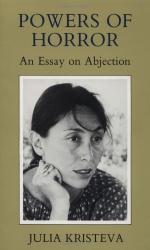
|
| Name: _________________________ | Period: ___________________ |
This test consists of 15 multiple choice questions and 5 short answer questions.
Multiple Choice Questions
1. Kristeva says the abject is never considered to be what?
(a) An argument.
(b) A substance.
(c) A pseudo-object.
(d) A question.
2. In what country is it strictly forbidden for a person of one caste to procreate with a person of another caste?
(a) Canada.
(b) Spain.
(c) India.
(d) Mexico.
3. The author says the traditional Freudian model of the Oedipal triangle is what?
(a) Deficient.
(b) Perfect.
(c) Flawed.
(d) Wrong.
4. According to Kristeva's definition of the abject, the abject cannot be acknowledged through what?
(a) Feeling.
(b) Language.
(c) Experience.
(d) Art.
5. What act in Jewish laws makes women impure for weeks?
(a) Sex.
(b) Menstruation.
(c) Childbirth.
(d) Rape.
6. What does Kristeva say is, historically, man's primary response to the perversion caused by the abject?
(a) Religion and morality.
(b) Lawlessness and insubordination.
(c) Denial and hatred.
(d) Rejection and fear.
7. Kristeva says Freud echos what German writer when he says "In the beginning was the deed"?
(a) Fürst.
(b) Goethe.
(c) Hasenclever.
(d) Broecking.
8. What belief states that Christ is simultaneously man and God?
(a) Embodiment.
(b) Incarnation.
(c) Manifestation.
(d) Epitome.
9. Kristeva quotes "And ye shall be unto me a kingdom of priests, and an holy nation" from what book of the Bible?
(a) Exodus.
(b) Joel.
(c) Numbers.
(d) Genesis.
10. Who in the New Testament said that sin did not enter the world until law was created?
(a) Peter.
(b) Paul.
(c) Mark.
(d) John.
11. Kristeva says the permission, given in the Old Testament, to eat some animals is given out of a recognition of what?
(a) Man's evil nature.
(b) Noah's faithfulness.
(c) Man's kindness.
(d) A unity with nature.
12. What way does Kristeva say a person will begin to act in when he no longer has any regard for the law?
(a) Depressed.
(b) Evil.
(c) Anti-social.
(d) Angry.
13. Whose work does Kristeva look to help explain the relation of impurity and the abject?
(a) E. E. Evans-Pritchard.
(b) Mary Douglas.
(c) M. N. Srinivas.
(d) Émile Durkheim.
14. According to Kristeva, Christ invited his disciples to see what from several angles?
(a) Issues regarding his diety.
(b) Ethical issues.
(c) His teachings about God.
(d) The validity of laws.
15. Kristeva accepts the psychoanalytic theories of what psychoanalyst?
(a) Hartmann.
(b) Freud.
(c) Kris.
(d) Rappaport.
Short Answer Questions
1. In the Bible, man is forbidden from drinking the blood of what?
2. Kristeva points out that there is a corresponding amount of importance placed upon social status in societies where the autonomy of women is relatively what?
3. What does Kristeva says is the only way man can express the abject?
4. Freud believed his Oedipus complex produces a kind of mental archetype for what?
5. In the Old Testament, Adam was punished for eating from what?
|
This section contains 444 words (approx. 2 pages at 300 words per page) |

|




